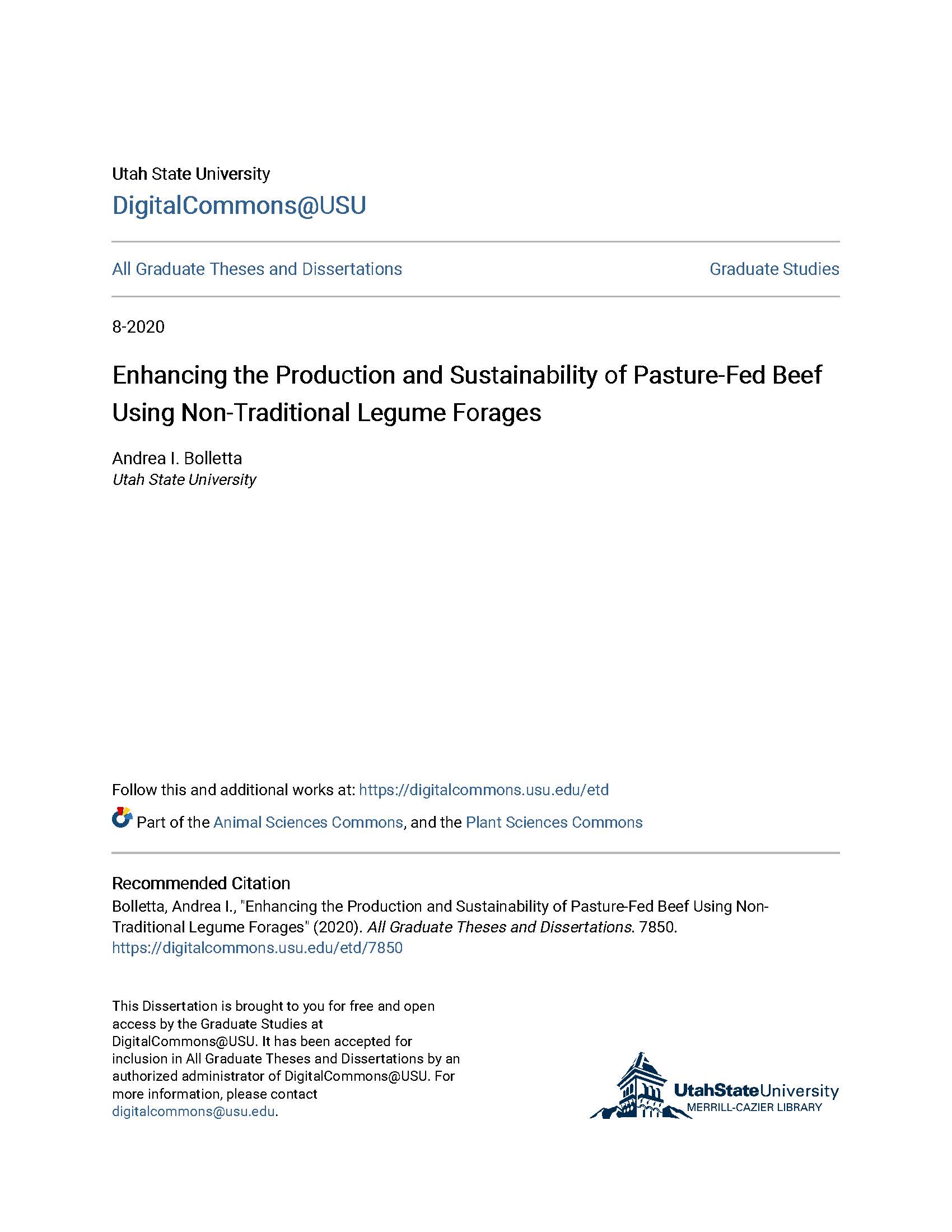Ver ítem
- xmlui.general.dspace_homeCentros Regionales y EEAsCentro Regional Buenos Aires SurEEA BordenaveTesisxmlui.ArtifactBrowser.ItemViewer.trail
Enhancing the Production and Sustainability of Pasture-Fed Beef Using Non-Traditional Legume Forages
Resumen
Despite the increasing worldwide demand for beef as a protein source, consumers are concerned about the sustainability of ruminant production systems. Their main concerns are animal welfare for feedlot-fed animals, greenhouse gas (GHG) emissions, global warming and worker safety. Traditional feedlot-based beef production systems have been associated with locally greater levels of soil, water and air contamination, as well as the overuse of antibiotics and
[ver mas...]
Despite the increasing worldwide demand for beef as a protein source, consumers are concerned about the sustainability of ruminant production systems. Their main concerns are animal welfare for feedlot-fed animals, greenhouse gas (GHG) emissions, global warming and worker safety. Traditional feedlot-based beef production systems have been associated with locally greater levels of soil, water and air contamination, as well as the overuse of antibiotics and growth hormones. The use of legume pastures such as cicer milkvetch (CMV) and birdsfoot trefoil (BFT), which fix their own nitrogen (N) and often contain beneficial secondary compounds such as tannins and provide for rapid gain and improved meat quality, holds promise as an alternative strategy to feedlots for beef finishing. These legumes can mitigate GHG emissions without reducing beef productivity and improve enterprise profitability when sold locally as natural or organic pasture-finished meat. Tannins can be beneficial to ruminants or some types, especially in high concentrations, can have anti-herbivore properties. The condensed tannins synthesized by BFT are known to prevent bloat and to enhance the production of ruminants. More generally, tannins are beneficial not only to the plants that accumulate them, but can also slow soil mineralization of organic matter, better matching N release to plant uptake. Ruminants can convert fibrous feedstuffs not suitable for human consumption, such as corn stalks, into sources of high-quality protein for human consumption, and thrive without grain on pastures and hay produced on marginal land that is not suitable for cultivation. Legumes pay a key role in the mitigation of environmental impacts of beef production, because their elevated forage quality increases digestion rate, intake and animal gain, their tannins improve the efficiency of rumen N utilization, and their quality and tannin concentrations both tend to reduce enteric CH4 emissions and N losses. Likewise, plant litter and manure from tannin-containing species would help to sequester N and carbon in the production system, helping to achieve sustainable beef production. Evaluation of the sustainability of ruminant production systems should be based on their environmental impact, the nutritive value of the food produced, the appropriate use of agricultural land, and the economic sustainability of producers and their rural communities.
[Cerrar]

Autor
Director de Tesis
MacAdam, Jennifer W.;
Descripción
Tesis para obtener el grado de Doctor of Philosophy (PhD), de la Utah State University, en agosto de 2020
Fecha
2020-08
Editorial
Utah State University
Formato
pdf
Tipo de documento
tesis doctoral
Palabras Claves
Derechos de acceso
Abierto
 Excepto donde se diga explicitamente, este item se publica bajo la siguiente descripción: Creative Commons Attribution-NonCommercial-ShareAlike 2.5 Unported (CC BY-NC-SA 2.5)
Excepto donde se diga explicitamente, este item se publica bajo la siguiente descripción: Creative Commons Attribution-NonCommercial-ShareAlike 2.5 Unported (CC BY-NC-SA 2.5)


